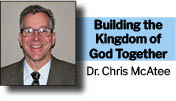
The Dignity of Work and the Rights of Workers is the Catholic Social Teaching (CST) principle I am focusing on this month.
The principle states, “The economy must serve people, not the other way around. Work is more than a way to make a living; it is a form of continuing participation in God’s creation. If the dignity of work is to be protected, then the basic rights of workers must be respected — the right to productive work, to decent and fair wages, to the organization and joining of unions, to private property, and to economic initiative.” (usccb.org/beliefs-and-teachings/what-we-believe/catholic-social-teaching/seven-themes-of-catholic-social-teaching)
What an amazing blessing it is to be co-creators with our Lord thorough our work!
As this principle also teaches, there are rights of workers that must be adhered to as well.
It is another great reminder that everyone is created in the image and likeness of God (Imago Dei) and that we all need to see God’s image and likeness in every person and in every way.
Comments on work
I always like to connect the CST principle I am writing about to individuals, groups, projects, and/or events in our diocese that reflect the principle.
I think this helps explain the principle in a very relevant way and it shows the many ways our Catholic Social Teaching is being lived throughout the Diocese of Madison.
Fr. Jim Murphy, pastor of Ss. Anthony and Philip Parish in Highland and St. Thomas Parish in Montfort, lives and integrates very well our Catholic Social Teaching principles into his life and through his ministry in many great ways.
I asked Father Murphy what the Dignity of Work and the Rights of Workers mean to him and how would he suggest we live this principle in our daily lives.
He said, “God gave us a good mind and muscles to work. Our work varies greatly but it allows us to support ourselves and our families. Seeing work as our ability to fulfill God’s plan is a down-to-earth approach to connect our faith life and our work life. How much you get paid may bring us off the lofty thoughts of God’s servants but it was the foundation issue for Catholic Social Teaching.
“Factory workers in the late 1800s were paid little to work long hours in unsafe conditions. This led Pope Leo XIII to consider this problem and then write ‘On the Condition of Labor’ in 1891. These were the early roots for Church support of union labor. Workers banding together to seek safe working conditions and a living wage were seen as good.
“The Church wanted to distinguish a major difference between the raw materials of production and the cost of human labor. The labor of people was not just one more cost of production.
“Msgr. George Higgins, a native of Chicago, worked for the U.S. bishops and was championed as a ‘labor priest.’
“For years, our Catholic Herald carried a syndicated column ‘The Yardstick’ authored by Monsignor Higgins. He was a great friend of labor unions and he knew that because they were made up of people, that had flaws and shortcomings.
“Because of his integrity, Monsignor Higgins was many times selected by labor and management as a mediator of labor disputes.
“I’m sure Monsignor Higgins would support the old union slogan ‘a rising tide lifts all ships.’
“Pope John Paul II was a powerful voice in the Gdansk (Poland) shipyard workers union choosing the name Solidarity. Work cannot be dignified if wages and benefits are insufficient to support a family.
“We live in a very competitive society. However, our faith would lead us to community as a priority. Instead of feeling we need to climb over other workers to advance, we ought to be workers that rejoice in stories of increase in benefits offered, advances in safety at the workplace, and labor disputes that are settled.
“We are one family of workers that ought to rejoice when other workers are treated well and respected. We can all contribute an attitude that reveals the dignity of work.”
May we always understand our work and our attitude towards what we do in a similar way as Father Murphy.
May we also live out as best we can our calling to be co-creators with God.
Dr. Chris McAtee is the director of the Office of Human Life and Dignity and publishes his column, “Building the Kingdom of God Together,” each month in the Catholic Herald. To contact Chris, you can email him at chris.mcatee@madisondiocese.org

